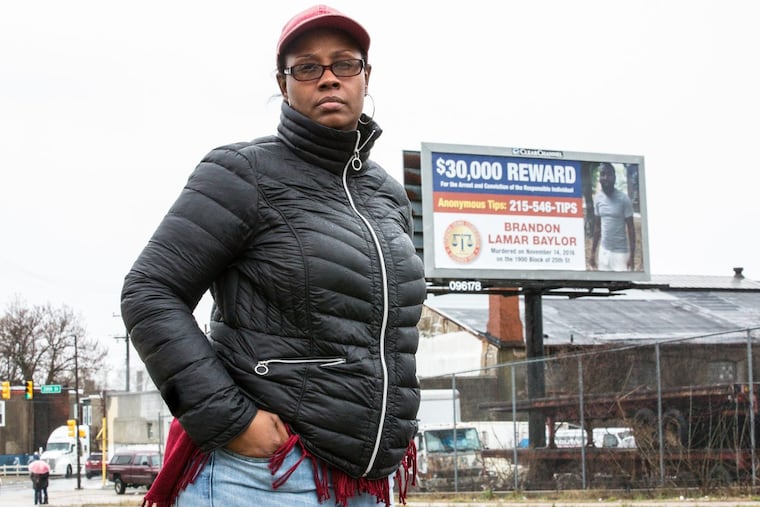Corrections officer finds herself wondering: Do you know who killed my son? | Helen Ubiñas
If the streets talk, prison is often where the conversation begins.

Mykia Capers has kept a close eye on the inmates in her care for 18 years.
Trained to look for any tell, she watches and wonders:
"Are they following the rules?" "Does anything seem off?"
Then, sometime after Nov. 14, 2016, another question started to settle into the corrections officer's daily mental checklist.
"Do any of them know who killed my son?"
On that winter day, Capers' only son, Brandon Lamar Baylor, was gunned down inside the Johnson Homes public housing development in Philadelphia, where his grandmother lives. He all but grew up there as his grandmother cared for him while Capers worked.
Baylor, 28, was shot once in the groin and another time in the chest.
Capers was still rushing to the hospital with few details when a colleague at Graterford called, already aware of what had happened. Everything would be OK, she tried to reassure her. She was praying for her.
If the streets talk, prison is often where the conversation begins.
At Temple University Hospital, Capers begged doctors to let her see her son. "If you take me to him," she recalls saying, "I guarantee you he's going to tell me who did this."
A doctor asked her to follow her into a private room. Capers refused to go anywhere until she saw her son. He's gone, the doctor finally said.
A police officer told her that if she promised not to touch his body, which was now part of an investigation, she could see her son.
"If you were in my shoes," she asked him, "would you make that promise?"
An officer led her down a hall. It was quiet, eerily so. There was blood on the floor, and then they came to the room where her son's body lay.
"He looked like he was asleep," she said, crying. She kissed him on his cheek, and promised him that she would not give up seeking justice until someone paid.
Capers was just 14 when she had her son; the two grew up together, an inseparable pair against the world. Eleven years ago she had a daughter, and Baylor had two children of his own, ages 3 and 10.
There were plenty of eyewitnesses to her son's shooting. Some of them even called themselves his friends.
There's a video, too, that in part shows two men walking toward the housing complex, one believed to be the driver and another, whom police identified as the shooter, running in and then out of the complex, gun still in hand.
But so far, no arrests have been made. No clear motive has been established, although Baylor had been arrested a few times for selling drugs.
Homicide Capt. John Ryan said the investigation continues.
That there is a video and eyewitnesses, and a year and a half later no one sits behind bars for her son's murder enrages Capers, who is 43. But it also fuels her. She's got a new detective on her son's case. She's pressed police and the District Attorney's Office for an explanation why the driver hasn't been charged for his part in the shooting.
Last week, she got word that a billboard announcing a $30,000 reward for information leading to the arrest and conviction of her son's murderer was up near the corner of North 29th Street and West Glenwood Avenue, across the street from Gideon Elementary, which she visited on a recent afternoon as children on break threw a big purple ball in the air.
It had just started to rain when she pulled her car to the curb and began recording live on Facebook. The sound of tires on wet pavement could be heard as she aimed her phone at the billboard that featured one of her favorite photos of her son.
"Pass the word," she said. "My son's billboard is up. Shooter, you can run, but you can't hide for long."
She's turned that last part into a hashtag she attaches to her social-media posts, a one-woman rallying cry.
Midway through the video, she goes silent, as if the sound cut off or she was done. And then she lets out a big sigh before speaking again, her voice cracking with emotion.
"We're going to get 'em, Brandon. It's not over. We're going to get 'em, baby."
Shortly after her son was killed, the man whom she believes drove the shooter was incarcerated for an unrelated crime in the prison where she works. By the time she realized it, he was transferred out. She wonders if he knew who she was.
It made her think, not only of her son but of other mothers of homicide victims who like her are waiting for justice.
What if these killers are already behind bars, on lesser charges, never to pay for their worst crimes?
And what, she wonders behind the concrete prison walls she reports to nearly every day, if the answers to her son's killing are even closer than she thinks?